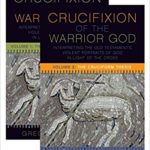We run our website the way we wished the whole internet worked: we provide high quality original content with no ads. We are funded solely by your direct support. Please consider supporting this project.

The Entire Old Testament is About Jesus
Jesus himself taught that he carried more authority than any prophet that predated him. Though Jesus regarded John as the greatest prophet up to himself (Matt 11:11), he claimed his own “testimony” was “weightier (megas) than that of John” (Jn. 5:36). Jesus certainly wasn’t denying John or any previous true prophet was divinely inspired. But he just as clearly was claiming that his revelatory authority trumped everything leading up to him.
In fact, in this same passage Jesus goes so far as to claim that he is the ultimate subject matter of previous revelations. In the course of confronting the Pharisees, he says: “You study the Scriptures diligently because you think that in them you possess eternal life. These are the very Scriptures that testify about me, yet you refuse to come to me to have life” (5:39-40). For this reason Jesus claimed that Moses would serve as their “accuser,” exposing their unbelief. For, Jesus added, “If you believed Moses, you would believe me, for he wrote about me” (5:45-46, emphasis added).
Jesus made the same point to certain disciples after his resurrection. After chiding them for being “slow to believe all that the prophets” had spoken about him, Jesus explained his death and resurrection by teaching them that “[e]verything” that was written about him in “the Law of Moses, the Prophets and the Psalms” had to be “fulfilled.” And in this way “he opened their minds so they could understand the Scriptures” (Lk 24:25, 44-45). In Jesus’ day, the phrase, “the Law, Prophets and Psalms” was widely used to refer to the whole OT.
So too, when Jesus explains his death and resurrection by associating them to what “must be fulfilled” (vs.44) and to “what is written” (vs. 46), he is alluding to the essence of the entire OT Scriptures, and not merely to a few verses that predicted these things. The same could be argued when Luke says Jesus “explained to them what was said in all the Scriptures concerning himself” (vs.27) and when he concludes that Jesus “opened their minds so they could understand the Scriptures” (vs.45). Throughout the passage, Jesus has the entire OT in view, not just selections from it. Thus we can conclude with Graeme Goldsworthy that “Jesus says the whole Old Testament, not merely a few selected texts, is about him.”[1]
On this basis, Poythress concludes that this “particularly important” passage is intended to teach that “Christ himself indicates that the Old Testament from beginning to end is about himself” and that “[t]he whole of the Old Testament … has as its central message the suffering and resurrection of Christ.”[2] David Dockery also concludes from this passage that “[f]or Jesus, the key to understanding the Old Testament was located in his own life and work, for everything pointed to himself.”[3]
Hence, this passage, as well as the earlier mentioned Johannine passage, force us to conclude that, regardless of how “diligently” one studies the Old Testament, one can’t be said to have arrived at the full, complete interpretation of any passage until they have disclosed how it bears witness to the one who is the ultimate revelation of God. Since Jesus’ testimony is “weightier” than John the Baptist, and therefore “weightier” than all preceding speakers, the revelation that comes through Jesus must never be placed alongside of any others. Rather, all others must be interpreted in light of the revelation that comes through Jesus.
[1] Goldsworthy, Gospel-Centered Hermeneutics, 252.
[2] Poythress, God Centered, 60
[3] D. S. Dockery, Biblical Interpretation Then and Now, 26.
Photo via Visualhunt
Category: General
Tags: Bible Interpretation, Cruciform Theology, Old Testament
Topics: Biblical Interpretation
Related Reading

Podcast: Crucifixion of the Warrior God—The MennoNerds Interview
Paul Walker begins his interview with Greg about Crucifixion of the Warrior God. Paul Walker can be found at MennoNerds. Follow MennoNerds on Twitter. PART ONE: http://traffic.libsyn.com/askgregboyd/Episode_0131.mp3 PART TWO: http://traffic.libsyn.com/askgregboyd/Episode_0132.mp3 PART THREE: http://traffic.libsyn.com/askgregboyd/Episode_0133.mp3 PART FOUR: http://traffic.libsyn.com/askgregboyd/Episode_0134.mp3 PART FIVE: http://traffic.libsyn.com/askgregboyd/Episode_0135.mp3 PART SIX: http://traffic.libsyn.com/askgregboyd/Episode_0136.mp3 PART SEVEN: http://traffic.libsyn.com/askgregboyd/Episode_0137.mp3 PART EIGHT: http://traffic.libsyn.com/askgregboyd/Episode_0138.mp3 PART NINE: http://traffic.libsyn.com/askgregboyd/Episode_0139.mp3 PART TEN: http://traffic.libsyn.com/askgregboyd/Episode_0140.mp3 PART…

Crucifying Transcendence
The classical view of God’s transcendence in theology is in large borrowed from a major strand within Hellenistic philosophy. In sharp contrast to ancient Israelites, whose conception of God was entirely based on their experience of God acting dynamically and in self-revelatory ways in history, the concept of God at work in ancient Greek philosophy…

The Centrality of Christ in Hebrews, Part 1
The intense Christocentricity that the New Testament writers embrace is nowhere more clearly and consistently illustrated than in the book of Hebrews. Throughout this work we find a repeated emphasis on the many ways the revelation given to us in Christ surpasses that of the Old Testament. The author begins by stressing how the revelation…

Reviewing the Reviews: Tom Belt (Part 1)
Tom Belt has written a four-part review of Crucifixion of the Warrior God on his blog An Open Orthodoxy. Parts 1 and 2 offer an overall fair and balanced summary of CWG, at least to the point that correcting misunderstandings would feel petty. In Part 3 Tom offers a critique of volume I, and this is what I’d like…

When the Last Few Moments Changes Everything
One of the central things ReKnew wants to accomplish is to challenge followers of Jesus to accept that the self-sacrificial love Jesus revealed on the cross is the definitive, and even the exhaustive, revelation of God’s character. Everything about God, we believe, should be understood through the lens of the cross. For most Christians, Jesus…

Sermon Clip: Does Romans 9 predestine you to Hell?
Did God predestine you to Hell? Can he even do that? In this short sermon clip, Greg Boyd talks about his own struggles when trying to understand Romans 9 which on the surface seems to imply that God determines who goes to heaven and hell. In the full sermon, Greg takes a deep look at…
